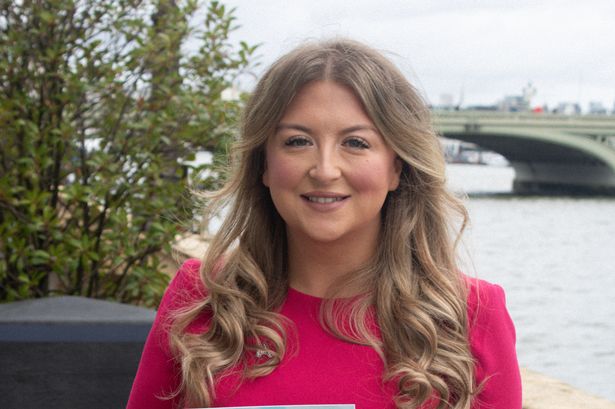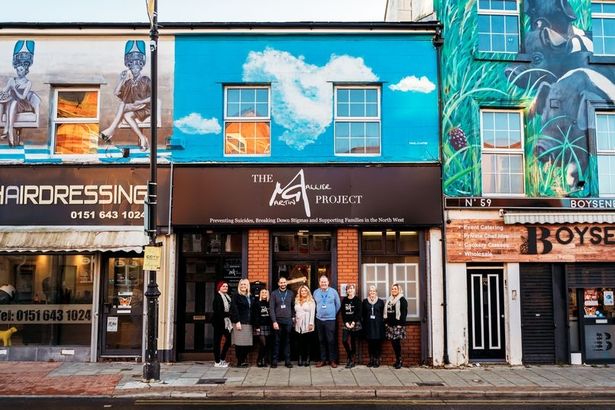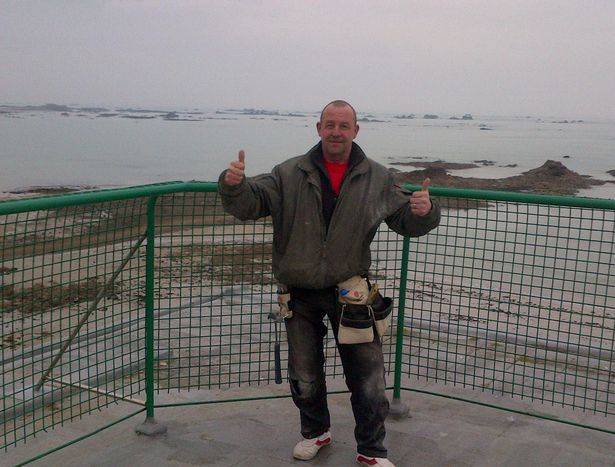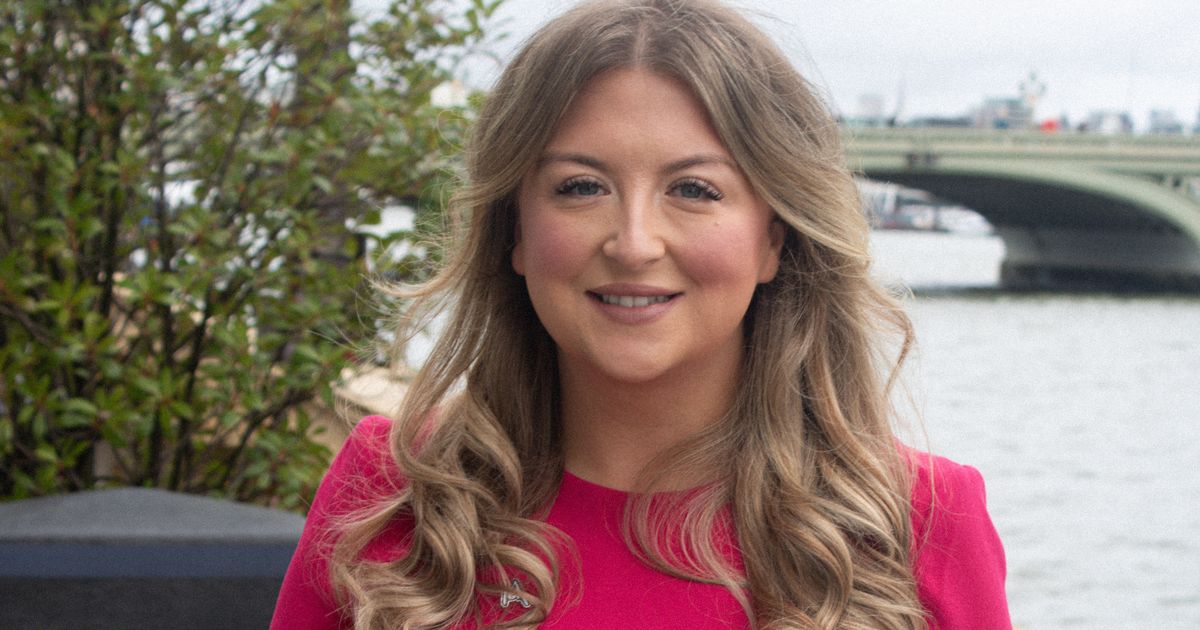Jessica Gallier-Booth set up The Martin Gallier Project following her dad’s tragic death in 2017 Jessica, together with Liverpool John Moores University, unveiled their groundbreaking research in front of Parliament on Thursday(Image: TMGP)
Jessica, together with Liverpool John Moores University, unveiled their groundbreaking research in front of Parliament on Thursday(Image: TMGP)
When Jessica Gallier-Booth received the devastating phone call her dad had taken his own life, her world fell apart. Just 12 weeks postpartum and basking in the joy of new motherhood, the news pulled her from euphoria to despair in an instant.
Her dad, Martin Gallier, was 55 when he died by suicide. He had been open with his family about his struggle with suicidal thoughts, often speaking candidly about them – something Jessica, then a teenager, never knew how to handle.
Speaking to the ECHO, Jessica, from Wirral, said: “My dad was the life and soul of the party. Funny, eccentric, always putting on a brave face. He worked so hard to make other people laugh but he suffered so much. It was all for show, the bravado. He’d go home and cry.
“We always knew dad struggled with suicidal thoughts; it was something he was really open about. My dad was very complex. As the eldest child, he leaned on me a lot.
“I remember him telling me at the age of about 13 or 14 that when everything became too much he would take his own life. I used to think that was normal. I just assumed that was just what people’s dads said.”
Despite her family’s awareness of Martin’s struggles, they lacked support needed to prevent the tragedy. Jessica, now 35, said: “We did our best with the limited knowledge we had. It wasn’t enough.”
 Jessica Gallier-Booth opened up on the death of her dad Martin(Image: Submitted)
Jessica Gallier-Booth opened up on the death of her dad Martin(Image: Submitted)
On February 7, 2017, Jessica was at a restaurant in the city centre when she received the phone call from her sister who said her dad had taken his own life.
Jessica, now a mum-of-two, said: “My legs just went from underneath me – they turned to jelly. I was 12 weeks post partum and I was the happiest woman in the world. I’d just had this gorgeous baby. I went from being on top of the world to the depths of hell in the space of a phone call.
“I knew in that moment that life as we knew it had ended and things would never be the same again.”
Following her dad’s death, Jessica was thrust into an almost year-long inquest process, hampered by missing information and gaps in his care. Without legal aid, and with no legal background, she made the brave decision to represent her family herself.
Jessica said: “There were files and files of case notes from services that were meant to help him. I knew the care my dad received wasn’t good enough. It felt like something bigger than me pushed me to challenge the coroner and ask those questions. It didn’t feel like a choice.”
 Jessica Gallier-Booth opened up on the death of her dad Martin(Image: Submitted)
Jessica Gallier-Booth opened up on the death of her dad Martin(Image: Submitted)
During sleepless nights reading case files, Jessica began to spot patterns – waiting lists, meeting certain criteria and systemic barriers that left people like her dad falling through the cracks. She added: “People were dying for reasons that felt preventable.”
On the day the coroner officially ruled Martin’s death a suicide, Jessica had what she describes as a “lightbulb moment.”
She said: “I’d seen too much and heard too much to walk away. I decided I was going to come up with a service my dad would have used.”
Just two years later, on February 23, 2019, Jessica opened The Martin Gallier Project in New Ferry, Wirral, with just 64 pence in the bank. Since then, the pioneering suicide intervention service has delivered over 50,000 life-saving interventions to more than 9,800 people.
Unlike other services, The Martin Gallier Project operates with a simple ethos: no criteria. No waiting lists. No barriers. People can walk in from the high street – just like walking into a café – and ask for help immediately.
At the heart of the service is a team of suicide intervention workers – highly trained professionals who listen without judgement and help clients explore what Jessica calls “the third option”.
Jessica said: “When someone is suicidal, they often feel there are only two choices: to live, which feels too overwhelming, or to die, which is huge and obviously permanent. We present them with another option: to stay safe, just for now, while we work through it together.”
 Members of The Martin Gallier Project(Image: MGP)
Members of The Martin Gallier Project(Image: MGP)
Unlike clinical settings, the project focuses on immediate, human-centred support rather than long waiting times or rigid protocols. It complements NHS services by filling in the urgent gaps, particularly during crisis moments.
The need for such services is growing rapidly. Jessica said: “Demand increases every single week. In the first six months of this year, demand was up 59% compared to the same period last year.”
She believes part of the problem is a societal misunderstanding of suicide: “There’s a dangerous narrative that only mentally ill people become suicidal. But often, it’s just a normal response to life stress – financial problems, bereavement, relationship breakdowns.”
Jessica is now campaigning to roll out The Martin Gallier Project model nationally. Working with Liverpool John Moores University, they’ve developed a tried-and-tested solution to the suicide crisis and are now seeking government backing to make it available across the UK.
 Jessica Gallier opened up on the death of her dad Martin(Image: Jessica Gallier)
Jessica Gallier opened up on the death of her dad Martin(Image: Jessica Gallier)
Jessica said: “Our NHS is amazing, but it’s not geared up to handle this kind of intervention. It’s not realistic to expect people to get the help they need in an A&E waiting room.”
Eight years after her dad’s death, Jessica has turned her grief into a powerful force for good – one that’s saved thousands of lives and counting. She said: “I created the service I wish my dad had. It won’t bring him back, but it’s saving thousands of lives.”
Demand for this service has increased by 59 per cent in the last year alone. To donate to the charity, click here.
To find out more about The Martin Gallier Project, click here.
Mental health support
Helplines and support groups
The following are helplines and support networks for people to talk to, mostly listed on the NHS Choices website
- Samaritans (116 123) operates a 24-hour service available every day of the year. If you prefer to write down how you’re feeling, or if you’re worried about being overheard on the phone, you can email Samaritans at jo@samaritans.org.
- CALM Campaign Against Living Miserably (0800 58 58 58) is a leading movement against suicide. It runs a UK helpline and webchat from 5pm to midnight 365 days a year for anyone who has hit a wall for any reason, who need to talk or find information and support.
- PANDAS (0808 1961 776) runs a free helpline and offers a support service for people who may be suffering with perinatal mental illness, including prenatal (antenatal) and postnatal depression plus support for their family or network.
- Childline (0800 1111) runs a helpline for children and young people in the UK. Calls are free and the number won’t show up on your phone bill.
- PAPYRUS (0800 068 41 41) is an organisation supporting teenagers and young adults who are feeling suicidal.
- Mind (0300 123 3393) is a charity providing advice and support to empower anyone experiencing a mental health problem. They campaign to improve services, raise awareness and promote understanding.
- Students Against Depression is a website for students who are depressed, have a low mood or are having suicidal thoughts.
- Bullying UK is a website for both children and adults affected by bullying.
- Amparo provides emotional and practical support for anyone who has been affected by a suicide. This includes dealing with police and coroners; helping with media enquiries; preparing for and attending an inquest and helping to access other, appropriate, local support services. Call 0330 088 9255 or visit www.amparo.org.uk for more details.
- Hub of Hope is the UK’s most comprehensive national mental health support database. Download the free app, visit hubofhope.co.uk or text SHOUT to 85258 to find relevant services near you.
- Young Persons Advisory Service – Providing mental health and emotional wellbeing services for Liverpool’s children, young people and families. tel: 0151 707 1025 email: support@ypas.org.uk
- Paul’s Place – providing free counselling and group sessions to anyone living in Merseyside who has lost a family member or friend to suicide. Tel: 0151 226 0696 or email: paulsplace@beaconcounsellingtrust.co.uk
- The Martin Gallier Project – offering face to face support for individuals considering suicide and their families. Opening hours 9.30-16.30, 7 days a week. Tel: 0151 644 0294 email: triage@gallierhouse.co.uk
- James’ Place – supports men over 18 who are experiencing a suicidal crisis by providing quick access to therapy and support. Call 0151 303 5757 from Monday to Friday between 9.30am and 5.30pm or visit https://www.jamesplace.org.uk/
